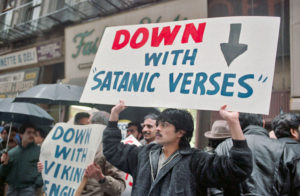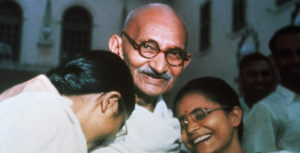“Fictions could be as powerful as histories.” In his new novel Victory City, Salman Rushdie comes as near as he has ever come to issuing a manifesto. His champions see him as a free speech martyr, his detractors as Satan reincarnated, but really, he’s a historian in novelist’s clothing. All his major novels, especially his recherché Indian ones, work at the level of national allegory. As he recently wrote in The Guardian: “For all its surrealist elements, Midnight’s Children is a history novel.” So, too, the new one, his 15th — though at the outset, it doesn’t feel like one.
If anything, Victory City feels like Sin City — cartoonishly brutal, emotionally stunted, jarringly anachronistic. There’s the usual parade of deities and elephants. But peel away the exoticism and one is left with a useful history lesson. For too long, pre-colonial India has been a tabula rasa for both nationalist and liberal projections. It was, Rushdie reminds us, no golden age.
For India’s Hindu supremacists today, the Vijayanagara empire was a land of cow’s milk and saffron-infused honey, a Hindu holdout in the Muslim Deccan, where Art and Culture, solemnly graced with capital letters, flourished unhindered by the depredations of the barbarians at the gates. (Those barbarians, of course, are all mascaraed Muslim men flaunting their philistinism, their many wives and their dextrosinistral script.) Queasily sharing a bed with the supremacists are liberals given to an allied fantasy, that pre-colonial Indian kingdoms were pristine, perfect societies, unsullied by contact with the West; that it took the Brits to cow a self-respecting people into submission.
Both are bovine delusions that Rushdie sends up in Victory City. His two fictional cow-herding founders of Vijayanagara, the brothers Hukka and Bukka, medieval India’s answer to Romulus and Remus, are apostles of openness. They briefly consider the beliefs of their subjects — “do you think they are circumcised or not circumcised?” — but are then confronted by the impracticability of the task: “Do you want to go down there and ask them all to open their lungis, pull down their pyjamas, unwrap their sarongs?” It’s all too much of a bother. “The truth is I don’t really care.”
Indeed, unlike Narendra Modi, the historical Vijayanagara’s rayas — rulers — weren’t that interested in the faith of the people they lorded it over. Rushdie, of course, gives their toleration a blasé touch, as if they were detached moderns. But the point stands: they may have been rather religious themselves, building temples and adopting deities, but they preferred not to saddle their subjects with their beliefs. Vijayanagara, in fact, was a fairly Islamicised affair, its kings dressing like Muslim rulers, its armies enlisting Muslim strategists and horse traders, its architecture incorporating Muslim motifs — a riot of arches and domes, vaulted arcades and squinches.
So, rather than a plucky Hindu kingdom standing alone in the South, enisled in a sea of Muslim kingdoms, Vijayanagara was, to all intents and purposes, indistinguishable from its neighbours. And those neighbours weren’t especially hostile. Bijapur’s Muslim kings, for instance, were not the grim, Sharia-obsessed, humourless, Isis types of lore, but rather, like Hukka and Bukka, a largely tolerant bunch. Hindu gods were halal, as were erotic miniatures.
War made quick work of religious distinctions in the real world. Vijayanagara’s rayas were men of fickle loyalties, siding with Bijapur against (also Muslim) Ahmadnagar at one time, and with Ahmadnagar against Bijapur at another. The corollary was also true: the Hindu Gajapati empire was once a sworn enemy of Vijayanagara. And according to the latter empire’s foremost historian, Burton Stein, its rayas registered their biggest military successes against the Hindu empires to its south, not the Muslim ones to its north. What’s more, these victories were secured in the main through the recruitment of Muslim mercenaries. In the end, a notionally “Muslim” triple alliance did in Vijayanagara — not because it was a Hindu kingdom, but because it had the temerity to declare war on all three of them.
Rushdie takes aim at the myths of not only the Hindu nationalists but also those of unthinking anti-imperialists. Today, an increasingly common view peddled by American academics has it that the caste system was a British construct, alien to the golden age to which Vijayanagara belonged. It is a view, moreover, that appears to be finding a receptive audience this side of the pond. The BBC, for one, has aired the risible claim of a Temple University geographer that “the pre-colonial written record shows little or no mention of caste”. The Indian polemicist and parliamentarian Shashi Tharoor argued much the same in a puerile Oxford Union performance, before repeating the assertion in the Guardian.
It’s an assertion that liberals, British as well as Indian, instinctively sympathise with, since it points the finger at the villainy of imperialists and casts the colonised as blameless victims. But it is just as blinkered and anachronistic as the pseudo-histories hawked by Hindu nationalists. As Rushdie rightly shows, and indeed as scores of sensible historians such as Ananya Chakravarti and Rosalind O’Hanlon have argued, caste hierarchy was the organising principle in pre-colonial Indian society. Endogamy was the norm: inter-dining, let alone inter-marriage, was rare to the point of nonexistence.
Rushdie’s allegorical “castes” — crows, owlets, parrots, songbirds — don’t get on. They live as communities apart, much as real castes did in Vijayanagara. Contemporary travellers recorded the wildly different lifestyles of the lower and upper orders, their mutually unintelligible customs. Here’s one of them, observing the consuming passions of the Brahmins, the priestly class, in 1535: “The learned Brahman [has] never married nor ever touched a woman… These people have such devotion to cows that they kiss them every day, some even on the rump, and with the droppings of these cows they absolve themselves from their sins as if with holy water.” He then goes on to describe a ritual associated with “that [low] caste of people called Telagas, amongst whom the wives are buried alive with their husbands when they die”.
Vijayanagara was no liberal utopia, then. It may have been multicultural to a certain extent, but Rushdie carefully avoids falling into the trap of viewing medieval India as a “composite culture”. Secularism was very much work in progress. Violence along religious and caste lines was not absent, and even the peaceful interludes were more of a passive, live-and-let-live business, rather than an active celebration of unity in diversity. As Rushdie shows, medieval India was a deeply divided society long before the arrival of the “foreign pink monkeys”.
Time and again, as in his previous novels The Moor’s Last Sigh and The Enchantress of Florence, toleration proves a false Eden. His latest heroine Pampa Kampana’s “theological laxity” proves elusive. Hindu supremacists take charge, and she is exiled to a forest. But then she returns to usher in a fleeting renaissance, only to be relegated by another Modi-type. The dark ages return. Here, then, is Rushdie’s cyclical interpretation of history: good times follow bad times follow good times follow bad times ad nauseam.
Above all, his new book paints a picture of life in pre-colonial India that isn’t pretty. As elsewhere, it was nasty, brutish, and short. Victory City opens with mass suicide, an all-too-graphic description of sati, self-immolation, as war widows throw themselves into flames to escape dishonour as their “fourth-rate” empire collapses. Severed heads circulate as if legal tender. A deposed king has his “crownless head” chopped off and filled with straw. These aren’t always magical realist flourishes. Some quick cross-checking reveals that Rushdie has culled many of these gory details from the accounts of two Portuguese travellers, Domingo Paes and Fernão Nunes, both of whom feature as prominent characters in Victory City. The latter’s memoir is especially graphic:
“The punishments that they inflict in this kingdom are these: for a thief, whatever theft he commits, howsoever little it be, they forthwith cut off a foot and a hand, and if his theft be a great one he is hanged with a hook under his chin… Nobles who become traitors are sent to be impaled alive on a wooden stake thrust through the belly, and people of the lower orders, for whatever crime they commit, he forthwith commands to cut off their heads in the market-place… These are the common kinds of punishments, but they have others more fanciful; for when the King so desires, he commands a man to be thrown to the elephants, and they tear him in pieces.”
“The past is a foreign country,” wrote L. P. Hartley, “They do things differently there.” Which is to say the past is never pretty. History is full of awkward facts. Fiction, especially good fiction, recognises this. Victory City will upset some liberals, of course, who will find no pre-colonial golden age between its covers. But I suspect it will rile up Hindu supremacists a lot more. As it happens, the villain of the piece in Rushdie’s fictional world is a faux-celibate pandit who has it off with the reluctant heroine, a prepubescent girl possessed by the deity Parvati. In other words, a Hindu goddess is raped by a Hindu priest. Rushdie may have spent the last 30 years of his life hiding from Muslim mullahs, but I fear he’ll have to spend his remaining ones fleeing their Hindu counterparts.
Disclaimer
Some of the posts we share are controversial and we do not necessarily agree with them in the whole extend. Sometimes we agree with the content or part of it but we do not agree with the narration or language. Nevertheless we find them somehow interesting, valuable and/or informative or we share them, because we strongly believe in freedom of speech, free press and journalism. We strongly encourage you to have a critical approach to all the content, do your own research and analysis to build your own opinion.
We would be glad to have your feedback.
Source: UnHerd Read the original article here: https://unherd.com/




